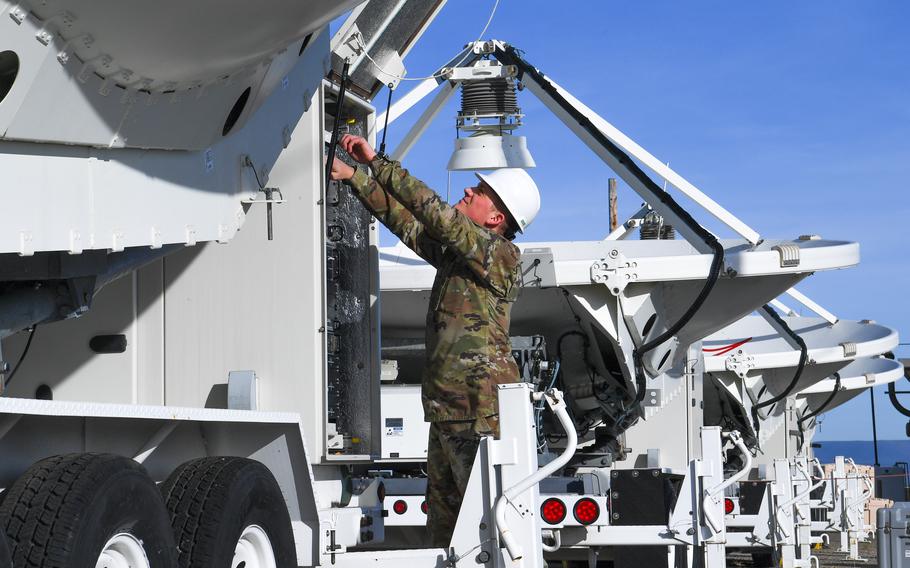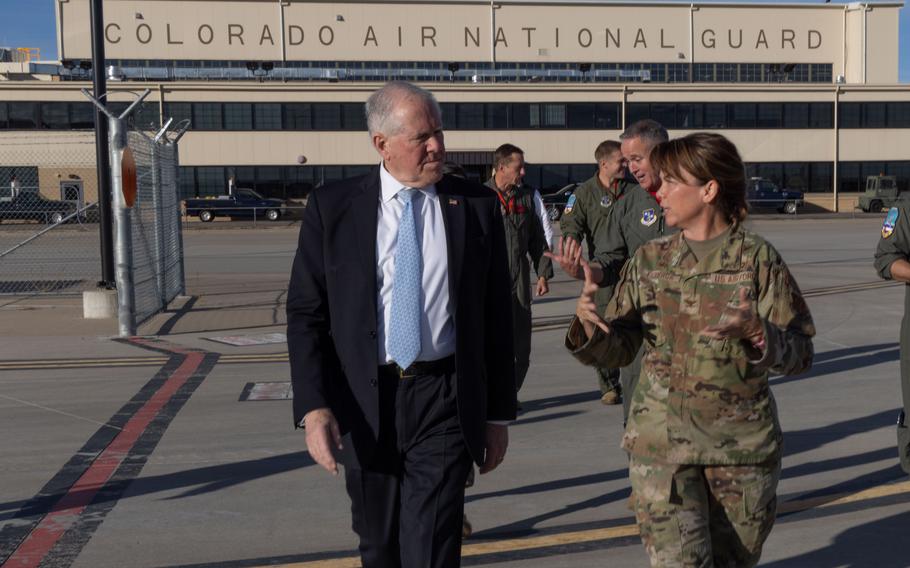
Air Force Senior Airman Payton Rogers, a 216th Electromagnetic Warfare Squadron systems operator, performs operational checks on the large multi-band antenna at Vandenberg Space Force Base, Calif., in November 2022. (Joseph Courtney/U.S. Air National Guard)
An Air Force proposal to transfer some operations jobs from the National Guard to the active-duty force will set the Defense Department back decades and hurt the recruiting and retention of part-time troops trained to fight, a retired Army general warned Thursday.
“We’ve provided nearly half the combat power of the Army, 30% of the combat Air Force power, we’ve been in the fight since 9/11, so why would you now relegate the Guard to this administrative and training role,” said Retired National Guard Maj. Gen. Francis McGinn, president of the National Guard Association of the United States.
He said he opposes the proposal to Congress from Air Force Secretary Frank Kendall to take nearly a dozen units from the Air National Guard that perform space missions and move them into the Space Force. Those troops would have the choice to join Space Force and be subjected to the rigors of active-duty military service or retrain for a new job in the Guard.
“This thing is half-baked at this point,” he said. “They’re asking them to jump into the abyss right now with a lot of risk. That’s our pushback from our membership.”
Losing the trust of those service members and removing those types of jobs from the Guard, McGinn argued, is coming at a time when the military has struggled for the past two years to meet its recruiting goals. A shrinking number of young Americans meet the standards to serve, and, for those interested in space, civilian jobs can offer higher pay and more flexibility.
As of March, the Air National Guard is about 7% shy of its recruiting goal for fiscal 2024, which ends Sept. 30, according to the Defense Department. In the previous year, the Air National Guard only reached 61% of its goal of 11,745 new members.
For the past month, the Guard association and a bipartisan collection of 140 House members, senators and state governors have campaigned strongly against the Air Force’s proposal. Members of Congress have asked their colleagues on the House and Senate Armed Services committees to pull the proposal from inclusion in this year’s defense spending bill, where it sits awaiting approval.

Air Force Secretary Frank Kendall receives a tour of a mobile ground station on Nov. 3, 2023, from Air Force Col. Stephanie Figueroa, commander of the 233rd Space Group at Buckley Space Force Base, Colo. (Benjamin Kimball/U.S. Air National Guard)
An April report analyzing the decision stated readiness for those units will temporarily drop because some people serving in the Guard will not choose to accept membership into the Space Force and will need to be replaced.
Kendall wrote in the report that housing the units outside of Space Force “has created management and leadership issues and uncertainty about their future for the affected units and people.”
Surveys have shown 70% to 80% of Guard members affected would rather retrain or retire instead of joining Space Force.
The report said 578 jobs in nine units spread across six states are affected by the decision. Of those jobs, 224 are full time, and 354 are part time. The estimated cost is $84.4 million, with about $50 million spent on transferring units from the Guard to Space Force. The transfer would take about five years, according to the report.
However, the Guard association puts the number of affected personnel closer to 1,000 from 14 units in seven states. More so, airmen assigned in a support position to those units will not be taken into the Space Force, and the states will be obligated to find a new unit or position for them.
“If you have an F-16 [fighter jet] unit, it’s like saying I’m only going to take the pilots. I’m not going to take the refuelers, I’m not going to take the maintainers. Then you really don’t have an F-16 unit, you’ve got a bunch of pilots,” McGinn said. “I think what they are trying to do is just that.”
The Air Force analyzed two other scenarios for the Air National Guard units, according to its report. The first was to leave the units where they are, and the second was to create a Space National Guard, which has the support of the Pentagon’s National Guard Bureau and the National Guard association. However, Kendall determined these two options are inconsistent with the intent of Space Force’s creation more than four years ago.
Kendall’s proposal to move the units also circumvents the authority that governors have over their state’s National Guard troops. Utah Gov. Spencer Cox, who leads the National Governors Association, and Colorado Gov. Jared Polis, vice chairman of the association, have warned the move could set precedent to further exclude governors from Guard decisions.
The governors of all 50 states and five U.S. territories agree on the issue.
“Federal law requires consultation and approval from governors on any decisions to move National Guard units, plain and simple,” Cox and Polis said Thursday in a prepared statement. “Until Air Force leaders withdraw [the proposal], they are in violation of federal law. We cannot have productive conversations on this matter until [the proposal] is set aside. Governors are united on this point.”
The two met with Kendall on Wednesday and said they were disappointed Kendall did not commit to withdrawing the proposal.
“An action like this will violate the trust of the brave women and men who have volunteered to serve our states and our nation,” the governors wrote last month in a letter to Kendall’s boss, Defense Secretary Lloyd Austin.
Cox and Polis said they will continue to engage with Austin in hopes of finding a choice to which all parties can agree.